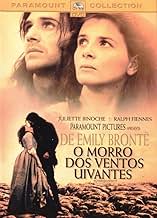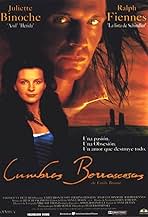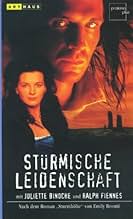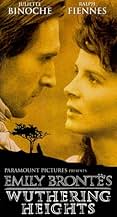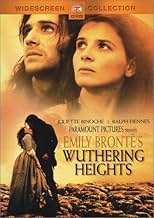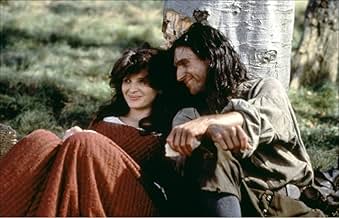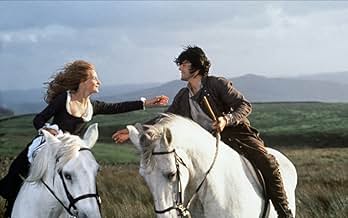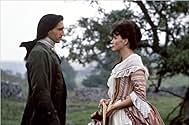A man becomes obsessed with vengeance when his soul mate marries another man.A man becomes obsessed with vengeance when his soul mate marries another man.A man becomes obsessed with vengeance when his soul mate marries another man.
- Awards
- 1 nomination
- Director
- Writers
- All cast & crew
- Production, box office & more at IMDbPro
Storyline
Did you know
- TriviaSinéad O'Connor makes an uncredited appearance as Emily Bronte.
- Quotes
Heathcliff: I pray one prayer, I repeat it till my tongue stiffens. Catherine Earnshaw, may you not rest as long as I am living! You said I killed you, haunt me, then!... Be with me always, take any form, drive me mad, only do not leave me in this abyss, where I cannot find you!... I cannot live without my life. I cannot live without my soul.
- ConnectionsFeatured in MsMojo: Top 10 Movie Couples Who Are Actually Toxic (2019)
Featured review
This is an unfairly maligned adaptation. True, if you judge it against more famous adaptations (e.g. the 1939 version), the first half of the film feels inadequate. However if you hold on in there, you'll get the second half of the book, revealing a plethora of themes Emily Bronte was exploring that are non-existent in the other films and revealing the novel's dark cruelty. Why previous adaptors chose to turn the film into a simple love story can be put down to sexism; had it been written by a man, the filmmakers would accept the brutal aspects of the book but of course a Victorian woman could never write such shocking things. For those who only know the story from previous adaptations or the brilliant Kate Bush song, it is a saga of hatred. Being rejected by his childhood love/adopted sister/soulmate Cathy Earnshaw (Juliette Binoche) when she chooses to marry prim Edgar Linton (Simon Shepard). Heathcliff vows vengeance on the Lintons by marrying Edgar's sister Isabella (Sophie Ward) and then also torturing Cathy and Edgar's daughter, Catherine Linton (Juliette Binoche- again!).
The film's mistake is that it is too tentative in the first half. Director Peter Kosminsky still wanted to give viewers the conventional love story that they knew and loved so he made the first half quite gentle in order to mitigate the darker second half. Unfortunately it means that Cathy and Heathcliff's relationship is not tempestuous enough. The famous declarations- "I AM Heathcliff", "I cannot live without my soul"- are spoken quietly and demurely.
Others have mentioned Binoche's excessive giggling, which doesn't convince me that she's seventeen but rather that she's under the influence. The criticisms of her accent is unfair; she has a clear French twang but it's hardly up there in the Hall of Bad Movie Accents. Fiennes' Yorkshire accent is far worse, sounding as if he'd learnt it through watching Postman Pat episodes. His initial niceness is overdone; Heathcliff is a gentle nature-loving soul who we cannot imagine why anyone would be so mean as to beat him as his adoptive brother Hindley (Jeremy Northam) does. Binoche is far too girlish as Cathy, who is essentially a tomboy and whose wild nature makes her identify with Heathcliff.
Things only really get going when Heathcliff returns, allowing Fiennes to drop the awful accent. Kosminsky keeps the novel's framed narrative, with tenant Mr Lockwood arriving at Wuthering Heights and meeting Heathcliff and Cathy II, who he mistakes to be Heathcliff's wife. If you are unfamiliar with the novel, it may be best to locate a family tree as a handy guide. Don't worry though; Emily Bronte meant the family tree to be messy and confusing. That is why I think the double-roling of Binoche as mother and daughter works. It shows how Heathcliff sees Cathy everywhere and adds a perverse sexual tension as well. Binoche is much better as the daughter and Fiennes is stronger as older Heathcliff.
One of the good things about the adaptation is its fidelity to the novel. Using much of the novel's original dialogue, we get a truer picture of Heathcliff's cruelty. It is hard to argue that Heathcliff isn't really that bad when he beats his wife, calls her an 'abject thing' and says she 'degenerates into a mere slut'. Fiennes refreshingly doesn't try to make Heathcliff sympathetic or gloss over his actions; rather he plays a torturer who is tired of tormenting yet unable to stop himself. Heathcliff could have left the second generation alone but instead he punishes them and plays with them like chess pieces.
Whilst I do like the perversely seductive evil of Fiennes' interpretation (his performance here is what got him the role of Amon Goth in Schindler's List), like Olivier he is a little too refined to play early Heathcliff. We can never really buy him as savage; in the book, he is characterised almost like a creature rather than a human. This is why to an extent readers pity him. However Fiennes' Heathcliff is suavely evil.
The inclusion of the second half of the novel is really what recommends this film and why fans of the novel should put it top of their list of adaptations to see. Bronte did not include the main characters' children to be cute or to drag out the story. It gives the story more impact, making the film a saga of one man's bitterness rather than a doomed love story. The film keeps the wonderfully atmospheric ending of the novel and shows through the second generation that the conflict may be resolved and that the things dividing Cathy and Heathcliff will not divide this second generation. Other film adaptations ignore this small ray of optimism and hence the novel is remembered as a big misery fest. First timers to the story may find themselves lost; Wuthering Heights is an odd tale even in the generic film adaptations. The relevance of the second half may not be instantly apparent to them and will certainly be confusing if they come to it with preconceptions of the story. However a re-watch brings new subtleties and nuances that aren't present in the other film adaptations (bar elements of the dreadfully dull 2011 version).
Ironically in order to see the true nature of the story, you have to watch two flawed films (1992 and 2011). One day someone will get it right- hopefully the 1992 film has opened up doors for future films to tackle both generations.
The film's mistake is that it is too tentative in the first half. Director Peter Kosminsky still wanted to give viewers the conventional love story that they knew and loved so he made the first half quite gentle in order to mitigate the darker second half. Unfortunately it means that Cathy and Heathcliff's relationship is not tempestuous enough. The famous declarations- "I AM Heathcliff", "I cannot live without my soul"- are spoken quietly and demurely.
Others have mentioned Binoche's excessive giggling, which doesn't convince me that she's seventeen but rather that she's under the influence. The criticisms of her accent is unfair; she has a clear French twang but it's hardly up there in the Hall of Bad Movie Accents. Fiennes' Yorkshire accent is far worse, sounding as if he'd learnt it through watching Postman Pat episodes. His initial niceness is overdone; Heathcliff is a gentle nature-loving soul who we cannot imagine why anyone would be so mean as to beat him as his adoptive brother Hindley (Jeremy Northam) does. Binoche is far too girlish as Cathy, who is essentially a tomboy and whose wild nature makes her identify with Heathcliff.
Things only really get going when Heathcliff returns, allowing Fiennes to drop the awful accent. Kosminsky keeps the novel's framed narrative, with tenant Mr Lockwood arriving at Wuthering Heights and meeting Heathcliff and Cathy II, who he mistakes to be Heathcliff's wife. If you are unfamiliar with the novel, it may be best to locate a family tree as a handy guide. Don't worry though; Emily Bronte meant the family tree to be messy and confusing. That is why I think the double-roling of Binoche as mother and daughter works. It shows how Heathcliff sees Cathy everywhere and adds a perverse sexual tension as well. Binoche is much better as the daughter and Fiennes is stronger as older Heathcliff.
One of the good things about the adaptation is its fidelity to the novel. Using much of the novel's original dialogue, we get a truer picture of Heathcliff's cruelty. It is hard to argue that Heathcliff isn't really that bad when he beats his wife, calls her an 'abject thing' and says she 'degenerates into a mere slut'. Fiennes refreshingly doesn't try to make Heathcliff sympathetic or gloss over his actions; rather he plays a torturer who is tired of tormenting yet unable to stop himself. Heathcliff could have left the second generation alone but instead he punishes them and plays with them like chess pieces.
Whilst I do like the perversely seductive evil of Fiennes' interpretation (his performance here is what got him the role of Amon Goth in Schindler's List), like Olivier he is a little too refined to play early Heathcliff. We can never really buy him as savage; in the book, he is characterised almost like a creature rather than a human. This is why to an extent readers pity him. However Fiennes' Heathcliff is suavely evil.
The inclusion of the second half of the novel is really what recommends this film and why fans of the novel should put it top of their list of adaptations to see. Bronte did not include the main characters' children to be cute or to drag out the story. It gives the story more impact, making the film a saga of one man's bitterness rather than a doomed love story. The film keeps the wonderfully atmospheric ending of the novel and shows through the second generation that the conflict may be resolved and that the things dividing Cathy and Heathcliff will not divide this second generation. Other film adaptations ignore this small ray of optimism and hence the novel is remembered as a big misery fest. First timers to the story may find themselves lost; Wuthering Heights is an odd tale even in the generic film adaptations. The relevance of the second half may not be instantly apparent to them and will certainly be confusing if they come to it with preconceptions of the story. However a re-watch brings new subtleties and nuances that aren't present in the other film adaptations (bar elements of the dreadfully dull 2011 version).
Ironically in order to see the true nature of the story, you have to watch two flawed films (1992 and 2011). One day someone will get it right- hopefully the 1992 film has opened up doors for future films to tackle both generations.
- miss_lady_ice-853-608700
- Feb 5, 2015
- Permalink
- How long is Wuthering Heights?Powered by Alexa
Details
- Release date
- Countries of origin
- Official sites
- Language
- Also known as
- Emily Brontë's Wuthering Heights
- Filming locations
- East Riddlesden Hall, Bradford Road, Riddlesden, Keighley, Bradford, West Yorkshire, England, UK(Heathcliff works in the carding shed)
- Production company
- See more company credits at IMDbPro
- Runtime1 hour 45 minutes
- Aspect ratio
- 1.85 : 1
Contribute to this page
Suggest an edit or add missing content



